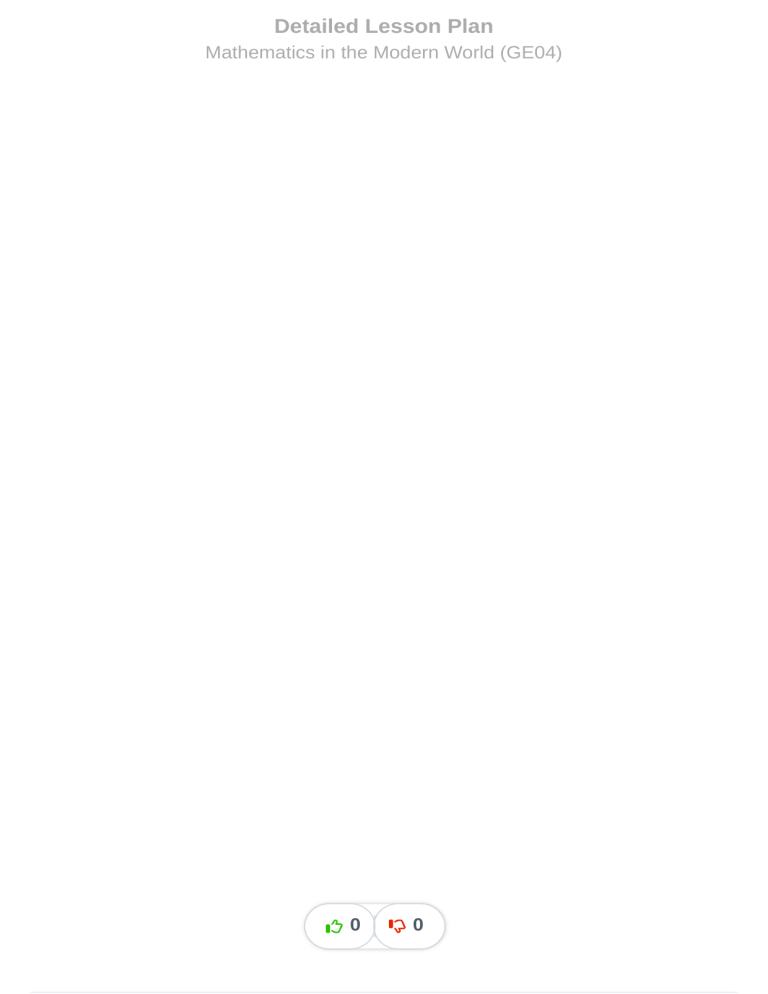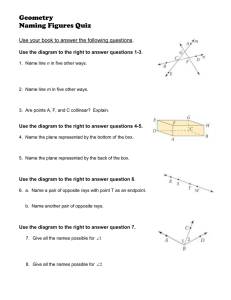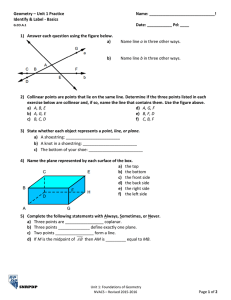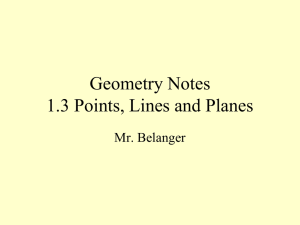
Detailed Lesson Plan Mathematics in the Modern World (GE04) 0 0 DATE: I. OBJECTIVES II. SUBJECT MATTER III. PROCEDURE A. DAILY ROUTINE February 14 – 18, 2021 At the end of the lesson the students should be able to: describe a mathematical system; define and illustrate a mathematical system; illustrates the need for an axiomatic structure of a mathematical system in general, and in Geometry in particular: (a) defined terms; (b) undefined terms; and participate actively in class discussion TOPIC: Mathematical System SUB-TOPIC: Undefined and Defined Terms REFERENCE: Mathematics Learning Module 8 MATERIALS: Laptop, WiFi, Cellphone, Earphone 1. Prayer and Greetings 2. Classroom Management 3. Checking of Attendance WHAT IS GEOMETRY? B. PREPARATORY ACTIVITY C. ACTIVITY PROPER Posing Questions: 1. What did the architect use in designing the buildings? 2. What did they consider in creating attractive patterns? Geometry is the visual study of shapes, sizes, patterns, and positions. It occurred in all cultures, through at least one of the five strands of human activities: 1. Building/structures 2. Machines/motion 3. Navigating/star-gazing 4. Art/patterns 5. Measurement Mathematical System Mathematical system is divided into four parts namely undefined terms, defined, terms, axioms or postulates and theorems. In geometry, we come across with terms which cannot be precisely defined and these are undefined terms. The point, line, and plane are called undefined terms. We cannot define these terms because they can only be described or illustrated. Unlike undefined terms (which do not have a formal definition), these terms have a formal definition. They are used to define even more terms. Collinear points, coplanar points and subsets of a line and more are called defined terms. A definition is an exact statement or description of the meaning of a term or word so that anyone using it will understand it in the same way. Postulates on the other side is a statement which is accepted as true without proof. These statements can be used as reasons in proving some mathematical statements. A theorem is a statement that can be proven. Once a theorem is proven, it can also be used as a reason in proving other statements. Undefined Terms POINT indicates a position in space. It has only location but no dimension, length, width, thickness and does not occupy an area. It is named using a CAPITAL LETTER and it can be modeled by a dot. 0 LINE has infinite length, no width, nor thickness. It extends infinitely in two Point M 0 POSSIBLE NAME OF THE LINE Line AB or 𝐴𝐵 opposite directions. It is represented by a straight line Line AC or 𝐴𝐶 Line BC or 𝐵𝐶 0 0 with two arrowheads. A line is named by two of its points with a symbol ↔ written on top of two letters. A line may also be named by one small letter or a number. A line has its parts or subsets. PLANE is a flat surface extending infinitely in all directions. A plane has infinite length, infinite width, but has no thickness. It is usually represented in drawings by a four‐sided figure. To name a plane you can use a capital letter written at the corner or using three non-collinear points in it. Line 𝑛 or Line 3 Plane PST Plane ℛ Classify the following examples as points, lines or planes. a. The top of your desk b. The light from a laser pointer c. The crease in a folded sheet of paper d. The chocolate chips on a cookie e. Bedroom walls f. Stars in the sky Examples: Using the figures below, name the given line in different ways. , 𝐹𝐸 𝐸𝐹 𝑅𝑆 , 𝑆𝑇 , 𝑇𝑆, 𝑆𝑅 , 𝑅𝑇, 𝑇𝑅 Plane ABC, Plane 𝒫 Defined Terms In undefined terms, point, line and plane were established. Now, these terms will be used to 0 study of geometry. define all other terms and0figures in the 0 0 Figure 1 Collinear points are points that lie on the same line while non-collinear points are points that do not lie on the same line. Coplanar points are points that lie on the same plane while non-coplanar points are points that do not lie on the same plane. a. Points X, Y, Z are collinear points b. Point A is non-collinear point c. Point A, X, Y, and Z are coplanar points Figure 2 Ray is a part of a line that starts at one point and extends infinitely in a set direction. It is named with its endpoint first, followed by another point on the ray. Ray AB or 𝐴𝐵 Ray BC or 𝐵𝐶 Ray BA or 𝐵𝐴 Ray CA or 𝐶𝐴 Opposite rays are rays with a common endpoint but extending in opposite directions Common endpoint: B 𝑎𝑛𝑑 𝐵𝐶 Opposite rays: 𝐵𝐴 Line Segment is a part of a line that made up of two endpoints. Segment AB or 𝐴𝐵 Segment BC or 𝐵𝐶 Segment AC or 𝐴𝐶 Example: Draw and label a figure for each condition. A. Point N lies on 𝑅𝑆 𝐑 𝐍 B. line u contains M and N but does not contain O. 𝐎 𝐌 C. Plane Y and Z intersect in k. 0 0 𝐒 𝐍


